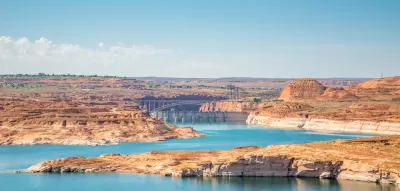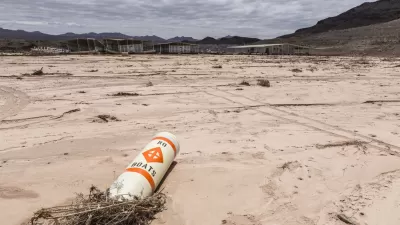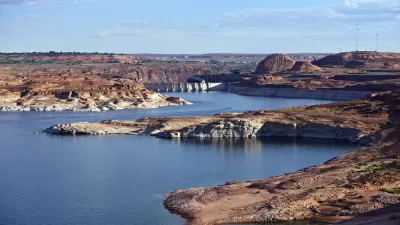Officials are releasing water from upstream reservoirs as water levels in the river's major reservoirs fall to historic lows.

As a historic drought continues into its third decade, the hydroelectric dams along the Colorado River will start seeing less electricity production, potentially causing electricity costs to rise across the West, writes Luke Runyon. "Lake Powell is the nation’s second largest reservoir," producing power for 5 million people. "Later in July it’s projected to hit its lowest point since it first filled in the 1960s, set to drop below its previous low set in 2005." If water levels continue to drop, "[h]ydropower production might become unfeasible at elevations above 3,490 feet due to turbine cavitation, when small air bubbles form and cause damage to the machine’s inner workings."
"The declining water levels have sent those who market and distribute Colorado River basin hydropower to their customers to figure out how to make up the energy deficit." Clayton Palmer with the Western Area Power Administration, which distributes power produced at Glen Canyon Dam, "said this year his agency will have to purchase millions of dollars in extra electrical power on the open market to fulfill their contracts."
On July 19, "[f]ederal officials laid out details of how reservoirs upstream of Lake Powell will release water in an attempt to keep producing hydropower," but the planned releases from upstream reservoirs amount to a short-term fix. "There comes a point where we can't engineer our way out of this," said Christopher Cutler, water and power services manager for the Bureau of Reclamation. "If the basin’s dry conditions continue into 2022, the situation could become more dire."
FULL STORY: Hydropower Worries Grow As Colorado River Reservoirs Keep Dropping

Planetizen Federal Action Tracker
A weekly monitor of how Trump’s orders and actions are impacting planners and planning in America.

Congressman Proposes Bill to Rename DC Metro “Trump Train”
The Make Autorail Great Again Act would withhold federal funding to the system until the Washington Metropolitan Area Transit Authority (WMATA), rebrands as the Washington Metropolitan Authority for Greater Access (WMAGA).

The Simple Legislative Tool Transforming Vacant Downtowns
In California, Michigan and Georgia, an easy win is bringing dollars — and delight — back to city centers.

The States Losing Rural Delivery Rooms at an Alarming Pace
In some states, as few as 9% of rural hospitals still deliver babies. As a result, rising pre-term births, no adequate pre-term care and "harrowing" close calls are a growing reality.

The Small South Asian Republic Going all in on EVs
Thanks to one simple policy change less than five years ago, 65% of new cars in this Himalayan country are now electric.

DC Backpedals on Bike Lane Protection, Swaps Barriers for Paint
Citing aesthetic concerns, the city is removing the concrete barriers and flexposts that once separated Arizona Avenue cyclists from motor vehicles.
Urban Design for Planners 1: Software Tools
This six-course series explores essential urban design concepts using open source software and equips planners with the tools they need to participate fully in the urban design process.
Planning for Universal Design
Learn the tools for implementing Universal Design in planning regulations.
Smith Gee Studio
City of Charlotte
City of Camden Redevelopment Agency
City of Astoria
Transportation Research & Education Center (TREC) at Portland State University
US High Speed Rail Association
City of Camden Redevelopment Agency
Municipality of Princeton (NJ)





























